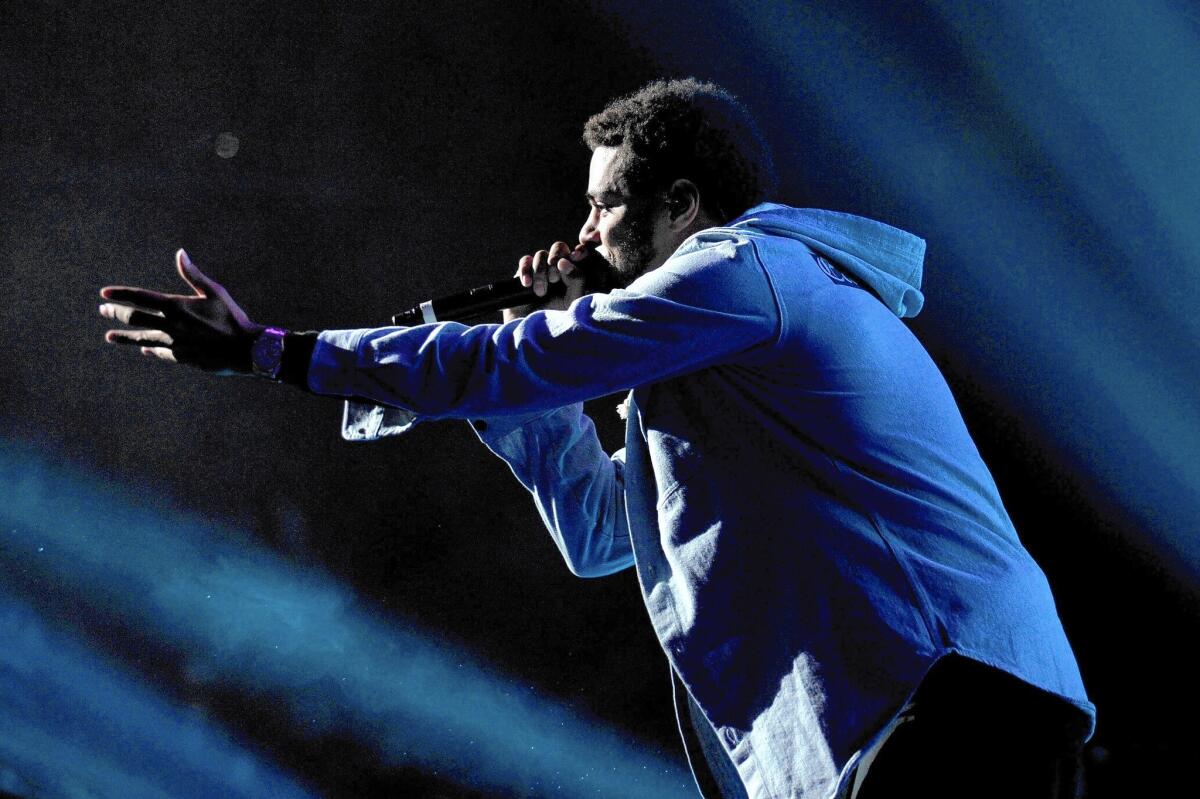Review: J. Cole’s ‘2014 Forest Hills Drive’ hits authentic notes

In an age of vicarious experience, when nearly anything can be consumed via someone else’s tweets, J. Cole believes in the value of physical proximity.
The rapper was one of the few boldface names to appear at the protests that broke out over the summer in Ferguson, Mo., after a police officer killed an unarmed black 18-year-old. He turned up again last week in New York City, where he was photographed taking part in a demonstration against a grand jury’s decision not to indict a police officer in the choking death of Eric Garner.
And when Cole announced recently that he’d completed a new album, the 29-year-old did so with a video documenting a trip to his North Carolina hometown.
“I got a lot more dreams, and I wanna go further,” he says in the slickly produced clip. “But at the same time, I don’t want it … if I have to become someone who’s so out of touch with what’s real.”
That insistence on authenticity is a familiar pose in hip-hop, which often measures success not by how far an artist travels but by how little that travel changes him. For Cole, though, the street isn’t just a source of (borrowed) credibility; it’s where this storyteller goes to absorb details that for others might merely be glimpsed on a screen.
“2014 Forest Hills Drive,” his third major-label disc, is thick with the residue of these immersions. Even when he’s drawing on his own experiences — the album’s title refers to the address of his childhood home — he exercises an observational acuity that suggests how much noticing he’s been doing lately.
In one track with an unprintable title and a warmly soulful beat he produced himself, Cole recounts being propositioned by a girl in his high school math class.
Yet the song isn’t a boast about his irresistibility (or isn’t entirely that): After acknowledging he was a virgin at the time, he moves step-by-step through the ensuing rendezvous, pointing out all the ways he concealed his nervousness with braggadocio. It’s surgical in its precision, and as moving as it is funny.
“Apparently,” with a piano-based arrangement that recalls Elton John’s “Bennie and the Jets,” is similarly unsparing as Cole describes how he was enjoying himself as a college kid in New York while his mother was being foreclosed upon back on Forest Hills Drive.
As potent as his self-evisceration can be, Cole comes most fully alive here when he turns outward.
“What’s the price for a black man life?” he asks in “January 28th,” one of several tracks that feel inspired by his fact-finding mission to Ferguson. “I checked the toe tag, not one zero in sight.”
In the growling “Fire Squad” he considers his place in the rap world — “Cole, you might be like the new Ice Cube meets the new Ice T” — then goes wider to ponder what rap means in a culture defined by white privilege.
“This year I’ll probably go to the awards show, dappered down / Watch Iggy win the Grammy as I try to crack a smile,” he says in a line that’s only more pointed now that Iggy Azalea, the blond-haired Australian rapper, was nominated last week for four Grammy Awards (including best rap album).
Later, “Love Yourz” takes up one of Cole’s favorite themes: his sense of conflict regarding the cushioned celebrity status that keeps threatening his connection to reality.
“No such thing as a life that’s better than yours,” he tells the listener, before insisting, “It’s beauty in the struggle, ugliness in the success.”
That idea isn’t an easy sell, as Cole himself goes on to admit. “I don’t mean no disrespect,” he says, addressing anyone “out there living in debt, cashing minimal checks.”
But then he delivers such a plain-spoken diagnosis of fame’s shortcomings — of the way it can distract the famous from the makings of true fulfillment — that you find yourself coming around to his rarefied perspective.
A deeply skilled empathizer, Cole can put you in his shoes too.
Twitter: @mikaelwood
J. Cole
“2014 Forest Hills Drive”
(Roc Nation/Columbia)
Three stars out of four
More to Read
The biggest entertainment stories
Get our big stories about Hollywood, film, television, music, arts, culture and more right in your inbox as soon as they publish.
You may occasionally receive promotional content from the Los Angeles Times.











